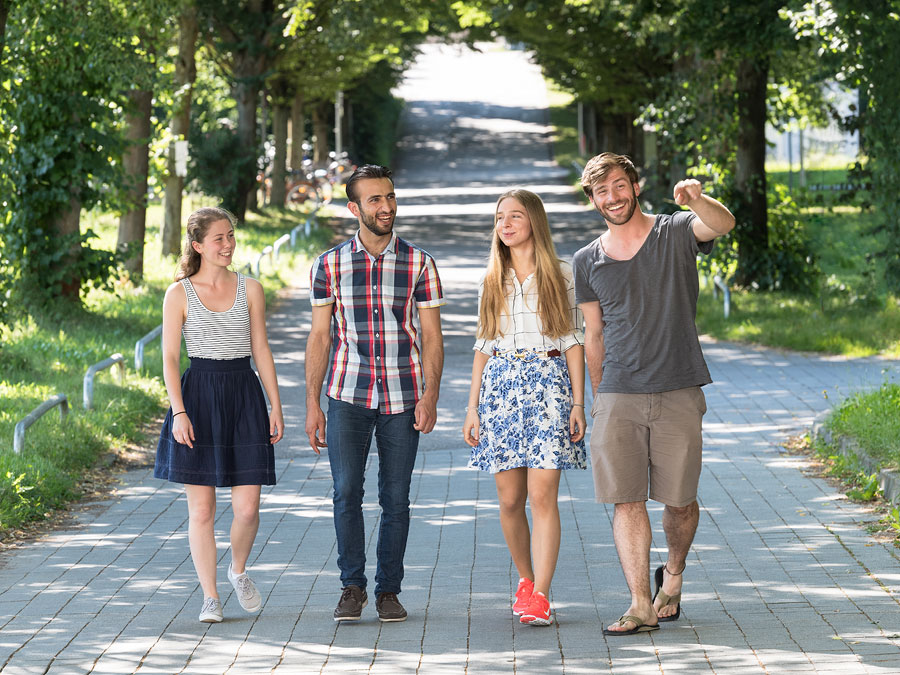Integration-tandems at the WZW:
When strangers become friends

“Integration und Gesellschaftsprozesse mit Asylsuchenden” is a bit of an unwieldy title… What does it stand for?
Christian: The seminar consisted of four block seminars in which we discussed topics such as causes of flight, political conflicts, as well as the theoretical background of asylum law. However, the core of the seminar focuses on tandem partnerships between students and young refugees.
Marietta: At the beginning of the seminar, we all got to know our tandem partners. Then, we met up with them regularly in our spare time.
Mustafa, you are from Syria and are Marietta’s tandem partner. What do you do together?
Mustafa: We talk a lot, and Marietta helps me to learn German or to do my homework. Sometimes, we cook a meal together or meet up with her friends, we might visit a museum or just be out and about with the other tandems. I have now been in Germany for nine months – and the tandem project is a great help for me.
Annemarie, how did you students come across the seminar?
Annemarie: I became aware of the seminar by an email from the study coordinators, and I was up for it right from the very beginning. The pilot project made it much easier for me to get involved – and for others like myself who have often thought about possible ways to help refugees, but were not sure when and where to start. I found it especially helpful that the project was supervised. We learned about some “do’s and don’ts”, were given advice by social workers, and had a contact person who was there for us.
There are credit points for taking part in the seminar. What are the other benefits?
Christian: My tandem partner is from Afghanistan. I can now say a few words in Persian (laughs) …but honestly, I really learned a lot in the seminar and by talking to him. The refugees are younger than we are, but – due to them being refugees – they have seen and experienced so much more than we have.
Marietta: The seminar helps to acquire intercultural skills, without even having to leave the country for travel or to study abroad. I learned so much during the last few months, on a personal level, it’s tremendous! And Mustafa has really become a friend.
What happens after the seminar?
Annemarie: I will of course keep up contact with my tandem partner Edith, who is from Nigeria. After the end of the seminar, we will continue to meet up in private – and I guess it’s the same for Marietta and Christian. Of course, we hope that the seminar will be offered again next semester. There is now a great network – involving the institutions, the residential homes, the refugees and the students – and it must be kept alive. It would be a good idea to continue the seminar and to also offer it at the other TUM-sites.
(Interview: Sabrina Czechofsky)
Marietta Lehnardt, 25, is in the second semester of her Biology studies. Her tandem partner Mustafa, 22, fled from Syria to Germany via Turkey. He is currently living in the communal accommodation “Steinkaserne” in Freising. Annemarie Krauss, 23, is a student of Biology in the 2nd Master’s semester. Edith, her 20-year-old tandem partner from Nigeria, lives in the container village in Freising. She is currently attending German courses in order to attend a vocational school in the coming school year. Christian Metz, 26, is a student of Agronomy. His tandem partner is only 18 years old, a refugee from Afghanistan. He has been in Freising for ten months, lives in a communal accommodation in Moosburg and commutes to Freising on a regular basis to meet up with Christian.
Commitment for refugees at TUM
The seminar was initiated by students and – as a pilot project – implemented by dedicated TUM-employees in cooperation with the HSG Freising. The idea is to acquire theoretical knowledge in a seminar and put it into practice outside the lecture rooms, helping refugees in the scope of regular meetings.
Anyone who is interested in showing commitment for refugees at TUM can become a “Buddy”; as a mentor in the TUM’s guest student program for refugees (“Buddies for Refugees”) or – in cooperation with the refugee camps in the district of Freising – in the scope of “Buddies for Integration in Freising”. Do you want to join next semester? If so, you can put your name down for “Buddies for Refugees” in the winter semester until August 15 or – for the project in Freising – contact Dr. Astrid Lux-Endrich (lux@wzw.tum) until September 15.